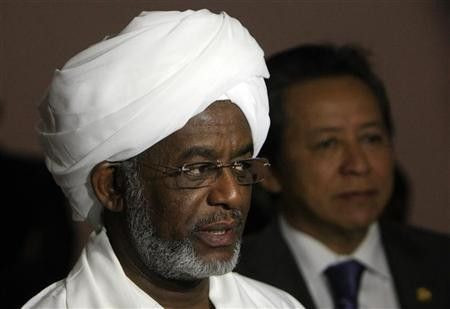Debt risks crippling Sudan: minister

Sudan's massive debt risks exacerbating a difficult economic situation as annual debt servicing costs hit about $1 billion following the secession of the south earlier this year, its foreign minister Ali Karti said.
Karti was in Paris to promote his country and the argument for relief on a $38-billion debt pile that remains a bone of contention with the now separate South Sudan.
We are working also on debt relief with France and others, because debt servicing incurs more than $1 billion annually, Karti told reporters on Thursday evening after a meeting with his French counterpart Alain Juppe.
The world could not simply stand back and watch the economy collapse given that Khartoum had not opposed the country's division, said Karti, who described the economy's woes as really serious.
We knew and now know that the secession of the south would be a great cost to the north and, in spite of that fact, we were determined to help the process and leave it to go its own way and respect that.
North Sudan, where 80 percent of 40 million Sudanese live, has been hit by a scarcity of foreign currency and high inflation that have sparked rare anti-government protests.
Its prime revenues had been oil, but it lost 75 percent of its 500,000 barrel-a-day oil production after the south became independent. Khartoum has tried to lower dependency on oil but economists say the pace of diversification has been slow.
Sudan's finance minister has said the country may need as much as $1.5 billion of foreign aid a year and plans to slash government spending by a quarter due to budget difficulties.
The World Bank has said Khartoum would need to introduce wide economic reforms to qualify for relief of multilateral debt. Nearly 90 percent of Sudan's external debt is owed to bilateral and commercial creditors, with their own requirements, and would take at least three years to clear, according to the Center for Global Development, a Washington think tank.
These were debts of one country and now there are two countries, so the question of debt and how to resolve it must be done jointly, Karti said.
Government creditors often hold talks about debt relief in the French capital under the auspices of the so-called Paris Club, although Karti did not refer specifically to that.
His government has unveiled a three-year economic stabilisation programme and Karti said a conference sponsored by Turkey and Norway at the start of December would look to drum up international investor interest and stimulate joint projects.
North Sudan and South Sudan have also yet to agree on sharing oil revenues and Karti said the African Union was continuing mediation efforts on that front.
ONGOING VIOLENCE
Another problematic issue is an escalation in violence in parts of the 2,000 kilometre (1,480 mile) border in the Blue Nile state and South Kordofan state, which risk drawing South Sudan into a proxy war.
President Omar Hassan al-Bashir said on Wednesday that North Sudan forces were poised to attack a stronghold of the rebels and would not allow foreign mediation. The government has refused to allow aid agencies into the areas.
We will not give access to the rebellion (areas) unless they (rebels) declare they respect the ceasefire and agree on the cessation of hostilities, Karti said.
Tensions between North Sudan's army and groups allied to the ruling party in South Sudan, the Sudan People's Liberation Movement (SPLM), in the Blue Nile area turned into armed clashes after the local governor turned against Khartoum.
The North Sudanese government has accused the SPLM of being behind the violence. The SPLM-North, the movement's branch in North Sudan, has blamed Khartoum.
Imagine if the mayor of Paris who is elected democratically decided to take up arms to fight against the French state. How would you react to that? Karti said.
© Copyright Thomson Reuters 2024. All rights reserved.





















